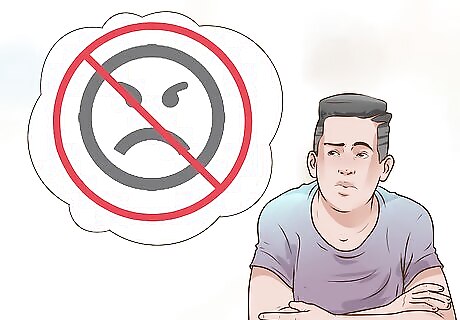
views
Processing the Argument

Cool down. You cannot expect to resolve an argument immediately after it has occurred. In the wake of a disagreement, take some time to cool down. Take a few hours, even a few days, to cool down and process your emotions properly. Take a long walk, go see a friend, watch a movie. Engage in relaxing activities until you've calmed down enough to look at the situation objectively. Don't: storm off without saying anything.Do: say "I'm upset and need some time to cool down. Can we talk about this tomorrow?"

Analyze what caused the fight. Fights rarely happen over nothing. Take some time to analyze what caused the fight and whether there is anything you could have done differently in the situation. Review what occurred. Why did you start fighting? What triggered the argument? What was said? Do you regret anything you said? Why or why not? Keep in mind memory is subjective, especially in stressful situations. It's likely your girlfriend might remember certain aspect of the fight differently than you. This is normal. It does not necessarily mean one of you is being untruthful. It's just that stress can cause memories to be inaccurate.

Express your feelings. After an argument, you need to accept and experience your feelings. While we may dislike emotions like anger and sadness, it's important to acknowledge them rather than ignore them. Stifling your feelings can cause an explosion down the road. Accept that emotions are not always rational. If your girlfriend hurt your feelings, for example, logically knowing she did not mean to do so, might not help you let it go. Know that you and your girlfriend are both entitled to an emotional response to a disagreement, even if that response is not entirely logical. Don't: shout "How could you do this?!"Do: say "I'm angry because you broke the promise you made yesterday."
Resolving the Argument

Plan a conversation. After you both have calmed down, suggest a time to discuss your conflict. After a big argument, it's important you schedule time to talk to assure you are both calm going into the discussion. Choose a time to talk where there aren't outside constrictions on time. Pick a week or weekend night when neither one of you has to work early in the morning. Aim to talk in the early evening sometime after dinner so hunger and sleepiness cannot interfere with your conversation. If you do not live together, try to choose a place that's a neutral ground. While you might feel odd discussing your relationship in public, a neutral ground might assure no one feels uncomfortable. You can pick a place where not many people are around, like a spacious, quiet coffee shop or a public park that's not usually crowded.

Use open body language. When discussing your conflict, use your body language to demonstrate that you are open to dialogue. This can allow the discussion to happen in a relaxed, effective way. Make eye contact. Nod occasionally to show you are listening. Never cross your arms or do anything that makes you look tense. Try to avoid nervous tics, like fiddling with your clothing or ringing your hands. Nod on occasion, as this gives a non-verbal indication you are listening to what is being said.

Use good verbal communication skills. When discussing your argument, use solid verbal communication as well. Your girlfriend needs to know you are open to working things out, so make sure you communicate with her effectively in the aftermath of a fight. Be clear and concise when speaking. Do not include too many details and try to get to the point of what you're going to say. Do not interrupt your girlfriend when she's talking. Always ask if she understands what you're saying. Ask for clarification if she says anything you do not understand. Use "I" statements. These assure that you're expressing your own feelings rather than placing objective judgment on the situation. For example, instead of saying "You overreacted about me being late and embarrassed me in front of your friends" say something like "I felt embarrassed when you called me out on being late in front of your friends."

Validate your girlfriend's feelings. It can be very frustrating to feel someone is not validating your feelings in a romantic relationship. Even if you do not agree with your girlfriend's assessment of a situation, make sure you strive to make her feel that her feelings are validated. Often, the simple act of allowing someone to feel the way they do removes a lot of tension from a situation. This releases pent up negative energy and will make your girlfriend feel like you genuinely care about making her happy. Don't: say "I'm sorry you feel that way, but it was just a harmless joke."Do: say "I didn't mean to hurt your feelings. I'm sorry I made you upset."

Figure out where you disagree. Most couples will have a few issues about which they cannot agree. This is normal, as humans are unique. Take an argument as an opportunity to figure out where the two of you differ and how you can reconcile these differences. If you have different expectations regarding time together, the relationship as a whole, or lifestyle choices, it's important to identify them and find a solution. See if you can figure out if there's an underlying issue that drove your argument. If you had a big argument, it's doubtful it was over a minor matter. Try and figure out where you disagree and what you can do to reconcile the disagreement. Sometimes simply acknowledging that you feel differently about a subject can help ease tensions. The two of you will end up taking certain things less personally if you understand where you differ personality wise. Don't: force your girlfriend (or yourself) to change on every point of disagreement.Do: suggest ways to limit conflict, such as avoiding contentious activities or topics while you're together.

Apologize. After contemplating your actions and role in the argument, apologize for any wrongdoing. Make the apology as specific and sincere as possible, to demonstrate that you have heard and understood your girlfriend's concerns. Don't: try to defend your actions with a "but..." or a reference to your girlfriend's behavior.Do: accept her reaction calmly, even if it's "Yes, you were a jerk."
Preventing Future Fights

Discuss new issues immediately. When you notice a problem is brewing, do not ignore it. Instead, discuss the issue before it becomes a large problem. This way you can prevent future blow-ups. Letting things bottle up means when the next argument happens you'll end up bringing things up from the past. This can make your girlfriend feel attacked and bombarded. When a problem arises, address immediately. Even a small issue can lead you to build resentment over time.

Create a process for resolving arguments without anger. Anger can make it hard to respond to a situation rationally. People often lash out in anger and end up alienating those close to them. Try to work with your girlfriend on finding a way to resolve issues without succumbing to anger. A good way to do so is to take 5 minutes to express your feelings when you have a disagreement rather than immediately trying to talk.

Listen for underlying emotional needs. Fights are often related to the fact certain emotional needs are being neglected. When your girlfriend is upset or frustrated with you, try to examine whether she has needs you're failing to meet. Have you been distance lately? Have you been busy to the point you're not spending as much time with her? Consider whether you're not meeting your girlfriend's needs and what you can do to help meet them.

Summarize what is discussed to assure you understand. After an argument, always take a moment to summarize what was discussed. How do you feel? How does your girlfriend feel? How are you both willing to work on the situation to assure it won't happen again? Taking five minutes to summarize a situation after an argument can prevent the argument from reoccurring.




















Comments
0 comment